Personalities
 |
 |
 |
 |
 |
 |
 |
The Epopee of St. Joan of Arc - II
The Political-Religious Panorama in France
Just as in the Old Testament we have the Chosen People, in the New Law we have the example of France, whose great role in Christendom the Popes have never tired of emphasizing. Pope Gregory IX writing to St. Louis King of France affirmed:
“God, whom the celestial legions obey, having established different kingdoms here according to the diversity of languages and climates, has conferred to many governments special missions for the completion of His designs. And, as in times past He preferred the tribe of Judah to those of the other sons of Jacob and gave it special blessings, so He chose France to be preferred above all the nations of the earth for the protection of the Catholic Faith and the defense of the freedom of the true Religion.
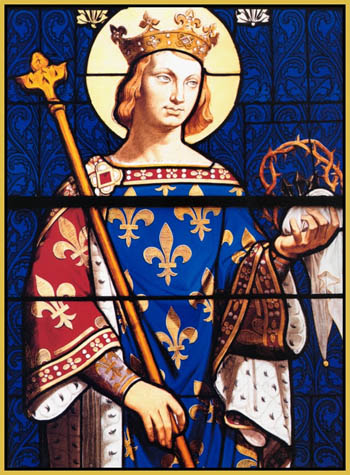 "This is why France is the kingdom of God himself, and the enemies of France are the enemies of Christ. This is why God loves France, because He loves the Church, which traverses the centuries and recruits the legions for eternity. God loves France, which no effort could ever fully sever from God's cause. God loves France, where Faith has at no time lost its vigor; where Kings and soldiers have never hesitated to face danger and give their blood for the preservation of the Faith and the liberty of the true Religion.”
"This is why France is the kingdom of God himself, and the enemies of France are the enemies of Christ. This is why God loves France, because He loves the Church, which traverses the centuries and recruits the legions for eternity. God loves France, which no effort could ever fully sever from God's cause. God loves France, where Faith has at no time lost its vigor; where Kings and soldiers have never hesitated to face danger and give their blood for the preservation of the Faith and the liberty of the true Religion.”
These admirable words written by Pope Gregory IX were recalled by St. Pius X in his allocution of December 13, 1908, pronounced after reading the decrees of beatification of St. Joan of Arc and other persons of French origin declared Venerable.
Now, this “most noble nation, missionary, generous, chivalrous” was passing through a critical and stormy phase of its history in the 15th century. The best of its nobility had been decimated on October 14, 1415, in the Battle of Agincourt, a major English victory in the Hundred Years' War. In Paris, the capital of the Kingdom, the fight between the Armagnacs and the Bourgognes raged on. The English had taken Rouen and all of Normandy had also fallen into their hands.
During a bout of insanity of King Charles V, his wife Isabeau of Bavaria and Phillip the Good, Duke of Burgundy, signed the Treaty of Troyes with the English, delivering France to England. The victor of Agincourt, Henry V, was recognized as Regent of France through his marriage to Catherine, daughter of Charles VI, and his successors were declared the heirs of the crown of the “most beautiful of kingdoms after the kingdom of Heaven.” In this way Bourgogne and England attempted to divide among themselves the spoils of the French Monarchy.
With forces of the Kingdom of England and the Duchy of Burgundy occupying Paris, the Dauphin Charles VII was obliged to seek refuge in the provinces beyond the Loire River. There, only four localities of some importance remained faithful to him: Mont-Saint-Michel in the west, Tournai in the north, Vaucouleurs in the east and Orléans in the center, which was already under seige by the English. Without great valor he sustained the fight against his two equally mighty adversaries: England and Burgundy.
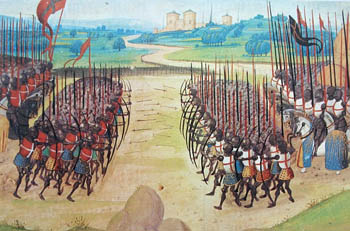 With the death of Charles VI, the Dauphin was proclaimed King by his faithful vassals. However, in Paris and Rheims, where the sovereigns of France were traditionally anointed and crowned, he was disparagingly called the “King of Bourges,” because the area around this city was one of the few remaining regions left to him. During this great trial, he reached such a state of despair as to ask God that, if He would not give him the victory, He woud at least not refuse him the mercy of escaping to Scotland or Spain.
With the death of Charles VI, the Dauphin was proclaimed King by his faithful vassals. However, in Paris and Rheims, where the sovereigns of France were traditionally anointed and crowned, he was disparagingly called the “King of Bourges,” because the area around this city was one of the few remaining regions left to him. During this great trial, he reached such a state of despair as to ask God that, if He would not give him the victory, He woud at least not refuse him the mercy of escaping to Scotland or Spain.
In France the rule of authority was destroyed; bandits crossed the country devastating it on all sides. The war of succession of Lorraine exploded in 1425. Everywhere populations were fleeing, frightened in the face of carnage, pillages, fire and devastation.
At that time in Europe, the Renaissance was starting. The Great Schism of the West was coming to an end. At the same time a heretical democratism was rising. In fact, through a series of heretics - John Wycliffe, Jan Hus, Peter Waldo (the Waldensians) and Luther – it sought to transfer to the people the authority of the high ecclesiastical spheres, which seemed to be declining.
Gallicanism was advocating the subordination of the rights of the Church to the power of the State and limiting the authority of the Pope in relation to the Bishops, claiming the superiority of a Council over the Pope (Conciliarism).
The mission of St. Joan of Arc
In view of these unparalleled calamities that fell over France in the 15th century, we must realize that this time it was not the pagan Huns or heretic Muslisms who were invading their territory, but Catholic England and, even more shocking, the no less Catholic Duchy of Burgundy.
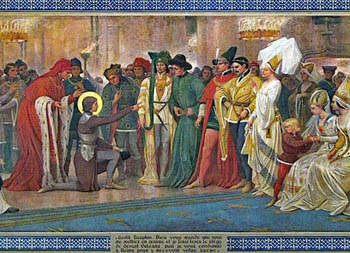 So then, the question rises: How do we connect the victory of France against this coalition and her providential role in the Church? Could it be that the Pseudo-Reformation was in gestation and an “English” France could have easily become a Protestant France? Who could foresee the extent of damage Christendom would have suffered in such a case?
So then, the question rises: How do we connect the victory of France against this coalition and her providential role in the Church? Could it be that the Pseudo-Reformation was in gestation and an “English” France could have easily become a Protestant France? Who could foresee the extent of damage Christendom would have suffered in such a case?
From this point of view, the mission of St. Joan of Arc must be considered above all as a supernatural mission. And the lesson her life offers is to invite us to meditate on the mysterious paths of Divine Providence acting on human events.
To save France , God chose a young shepherdess, ignorant, without any experience in the affairs of the world and gave her an assignment completely foreign to the common activities of her sex.
Responding to the call from Heaven, she was transformed from a peasant shepherd girl into a warrior in military garb, and she set out to cross enemy territory and enter the Castle of Chinon, where the King resided,- in order to convince him of the holy mission she had received from her Voices. Corresponding fully to the grace of her vocation, she declared: “I was born for this!” She was “sent by God to save France.”
She was infused with an unwavering confidence in Providence in these hours of uncertainty, in these stormy hours of France, even against all odds of success. Without even a tinge of personal vanity or artificiality, she was, as the 20th century French historian and statesman Gabriel Hanotaux asserted, “naturally supernatural.” Her sole desire was to carry out the command of God and, then, to return home to her parents to tend her sheep.
The Maid of Orléans demonstrated her fidelity to her mission in an examination by the theologians of Poitiers, commissioned by the King to investigate the veracity of what she affirmed.
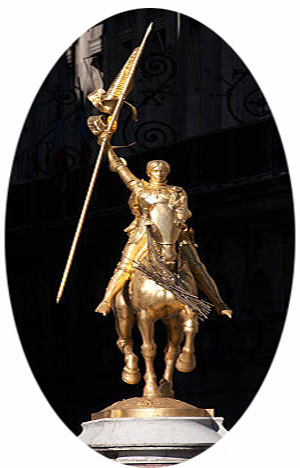 To believe her words, they demanded from her a sign that she was sent by God. She responded:
To believe her words, they demanded from her a sign that she was sent by God. She responded:
“In God's name! I have not come to Poitiers to works signs and marvels. But, take me to Orléans, and I will show you signs of why I am sent. Send me men in such numbers as may seem good and I will go to Orléans to deliver it from the hands of the English. And I will take the King to Reims to be crowned. Now is not the time to speak, but to act: use my services, because I will last but a short time.” (Johann Baptist Weiss, Historia Universal, Espasa Calpe, vol. 8, p. 842).
A Dominican put to her the following objection: “If God wills to deliver France from the English, he does not need soldiers for this.” The Maid replied: “In God's name, the soldiers will fight, and God will give the victory” ["En nom de Dieu, les gens d'armes batailleront et Dieu les donnera la victoire"]. We would say that her response here echos Judas Maccabeus' answer to the arguments of those who wanted to compromise in his time.
God wanted the French to use the human means within their reach to drive out the invaders of their homeland. The definitive judgment of the theologians of Poitiers was: “Joan is a good Christian, living as a Catholic. We did not find in her words or in her person anything that is contrary to the Faith. The King can and should receive her help, because to refuse her assistance would be to resist the Holy Spirit and to make himself unworthy of God’s help.” (Ibid, p. 844)
Even after the lifting of the siege of Orléans, Charles VII continued to show hesitation in going to Reims to be crowned. “Noble Dauphin,” said the Saint, “do not take too much time to deliberate: I will not last very long.”
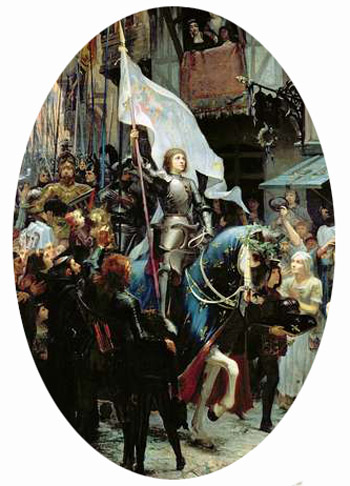

Continued
“God, whom the celestial legions obey, having established different kingdoms here according to the diversity of languages and climates, has conferred to many governments special missions for the completion of His designs. And, as in times past He preferred the tribe of Judah to those of the other sons of Jacob and gave it special blessings, so He chose France to be preferred above all the nations of the earth for the protection of the Catholic Faith and the defense of the freedom of the true Religion.

St. Louis IX became the model ideal for all Kings of France & was praised by Pope Gregory IX
These admirable words written by Pope Gregory IX were recalled by St. Pius X in his allocution of December 13, 1908, pronounced after reading the decrees of beatification of St. Joan of Arc and other persons of French origin declared Venerable.
Now, this “most noble nation, missionary, generous, chivalrous” was passing through a critical and stormy phase of its history in the 15th century. The best of its nobility had been decimated on October 14, 1415, in the Battle of Agincourt, a major English victory in the Hundred Years' War. In Paris, the capital of the Kingdom, the fight between the Armagnacs and the Bourgognes raged on. The English had taken Rouen and all of Normandy had also fallen into their hands.
During a bout of insanity of King Charles V, his wife Isabeau of Bavaria and Phillip the Good, Duke of Burgundy, signed the Treaty of Troyes with the English, delivering France to England. The victor of Agincourt, Henry V, was recognized as Regent of France through his marriage to Catherine, daughter of Charles VI, and his successors were declared the heirs of the crown of the “most beautiful of kingdoms after the kingdom of Heaven.” In this way Bourgogne and England attempted to divide among themselves the spoils of the French Monarchy.
With forces of the Kingdom of England and the Duchy of Burgundy occupying Paris, the Dauphin Charles VII was obliged to seek refuge in the provinces beyond the Loire River. There, only four localities of some importance remained faithful to him: Mont-Saint-Michel in the west, Tournai in the north, Vaucouleurs in the east and Orléans in the center, which was already under seige by the English. Without great valor he sustained the fight against his two equally mighty adversaries: England and Burgundy.

The French defeated at Agincourt set the stage for a future melding with England
In France the rule of authority was destroyed; bandits crossed the country devastating it on all sides. The war of succession of Lorraine exploded in 1425. Everywhere populations were fleeing, frightened in the face of carnage, pillages, fire and devastation.
At that time in Europe, the Renaissance was starting. The Great Schism of the West was coming to an end. At the same time a heretical democratism was rising. In fact, through a series of heretics - John Wycliffe, Jan Hus, Peter Waldo (the Waldensians) and Luther – it sought to transfer to the people the authority of the high ecclesiastical spheres, which seemed to be declining.
Gallicanism was advocating the subordination of the rights of the Church to the power of the State and limiting the authority of the Pope in relation to the Bishops, claiming the superiority of a Council over the Pope (Conciliarism).
The mission of St. Joan of Arc
In view of these unparalleled calamities that fell over France in the 15th century, we must realize that this time it was not the pagan Huns or heretic Muslisms who were invading their territory, but Catholic England and, even more shocking, the no less Catholic Duchy of Burgundy.

Joan identifies the Dauphin at his Court in Chinon and begins to win his confidence
From this point of view, the mission of St. Joan of Arc must be considered above all as a supernatural mission. And the lesson her life offers is to invite us to meditate on the mysterious paths of Divine Providence acting on human events.
To save France , God chose a young shepherdess, ignorant, without any experience in the affairs of the world and gave her an assignment completely foreign to the common activities of her sex.
Responding to the call from Heaven, she was transformed from a peasant shepherd girl into a warrior in military garb, and she set out to cross enemy territory and enter the Castle of Chinon, where the King resided,- in order to convince him of the holy mission she had received from her Voices. Corresponding fully to the grace of her vocation, she declared: “I was born for this!” She was “sent by God to save France.”
She was infused with an unwavering confidence in Providence in these hours of uncertainty, in these stormy hours of France, even against all odds of success. Without even a tinge of personal vanity or artificiality, she was, as the 20th century French historian and statesman Gabriel Hanotaux asserted, “naturally supernatural.” Her sole desire was to carry out the command of God and, then, to return home to her parents to tend her sheep.
The Maid of Orléans demonstrated her fidelity to her mission in an examination by the theologians of Poitiers, commissioned by the King to investigate the veracity of what she affirmed.

St Joan of Arc, a symbol of French militancy
“In God's name! I have not come to Poitiers to works signs and marvels. But, take me to Orléans, and I will show you signs of why I am sent. Send me men in such numbers as may seem good and I will go to Orléans to deliver it from the hands of the English. And I will take the King to Reims to be crowned. Now is not the time to speak, but to act: use my services, because I will last but a short time.” (Johann Baptist Weiss, Historia Universal, Espasa Calpe, vol. 8, p. 842).
A Dominican put to her the following objection: “If God wills to deliver France from the English, he does not need soldiers for this.” The Maid replied: “In God's name, the soldiers will fight, and God will give the victory” ["En nom de Dieu, les gens d'armes batailleront et Dieu les donnera la victoire"]. We would say that her response here echos Judas Maccabeus' answer to the arguments of those who wanted to compromise in his time.
God wanted the French to use the human means within their reach to drive out the invaders of their homeland. The definitive judgment of the theologians of Poitiers was: “Joan is a good Christian, living as a Catholic. We did not find in her words or in her person anything that is contrary to the Faith. The King can and should receive her help, because to refuse her assistance would be to resist the Holy Spirit and to make himself unworthy of God’s help.” (Ibid, p. 844)
Even after the lifting of the siege of Orléans, Charles VII continued to show hesitation in going to Reims to be crowned. “Noble Dauphin,” said the Saint, “do not take too much time to deliberate: I will not last very long.”


Continued
First published in Catolicismo, July 1956
Posted June 27, 2018
Posted June 27, 2018
______________________
______________________
 Volume I |
 Volume II |
 Volume III |
 Volume IV |
 Volume V |
 Volume VI |
 Volume VII |
 Volume VIII |
 Volume IX |
 Volume X |
 Volume XI |
 Special Edition |


